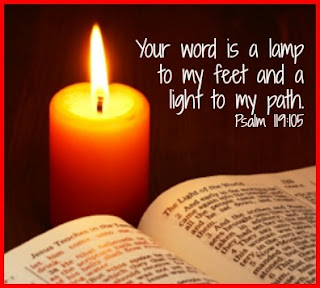THE SEED
”Your word is a lamp to my feet And a light to my path.“ Psalms 119:105 NKJV
Without the knowledge of the Word of God in our hearts, we can make mistakes that can hurt our entire lives. The word of God serves as the light to make us see and receive instructions in our present situation as well as the future. As I was driving one day, I had to change my car’s headlight from a dipped headlight mode to a full beam headlight because it was getting dark and I needed to catch a glimpse of the road ahead. With the full beam mode, I could see farther to be aware of any impending danger. Like the car headlights with different modes, so is the word of God. As we study the Word of God, it shines upon our immediate pathway and farther ahead to guide us. Your word is a lamp for my feet and a light on my path.” The verse also highlights the importance of not only hearing God’s Word but living accordingly. To live life according to God’s will, we first have to know how He has called us to live. To know that, we cannot rely first on our thinking, but instead, must hear what the Bible says. It was from the reading of God’s words that King Josiah became aware of the doom over his kingdom because they had been going in a different direction from God’s. Even though he couldn’t do much to save the situation, the awareness that brought about his crying and tearing of his royal cloth made God to spare his life from witnessing the pending destruction.
BIBLE READINGS: 2 Kings 22:11-20
PRAYER: Dear God, let your words continue to be a lamp to my feet.
Tuesday, October 29, 2024
IMOLE ATORUNWA OLOJUMEJI
IRUGBIN NAA
Ọ̀rọ̀ rẹ ni fìtílà fún ẹsẹ̀ mi,ati ìmolẹ̀ sí ipa ọ̀nà mi. Orin Dafidi 119:105
Laisi imọ Ọrọ Ọlọrun ninu ọkan wa, a le ṣe awọn aṣiṣe ti o le ṣe ipalara fun gbogbo igbesi aye wa. Ọ̀rọ̀ Ọlorun ń ṣiṣe gege bí ìmolẹ̀ láti je kí a rí àti gba ìtoni nínú ipò wa nísinsìnyí àti lojo iwájú. Bí mo ṣe ń wakọ̀ lojo kan, mo ní láti yí ìmolẹ̀ motò ọkọ̀ ayokele mi soke sii ní kíkún nítorí pé ó ti ṣókùnkùn, mo sì ní láti wo ojú ọ̀nà tí ó wà níwájú. Pẹlu ipo ina ni kikun, mo le rii siwaju lati mọ ewu eyikeyi ti n bọ. Gẹgẹbi awọn ina moto ọkọ ayọkẹlẹ pẹlu awọn ọna oriṣiriṣi, bẹẹ ni ọrọ Ọlọrun. Bí a ṣe ń kekọ̀o Ọ̀rọ̀ Ọlorun, ó ń tàn sí ipa ọ̀nà wa lójú ẹsẹ̀ àti síwájú láti to wa sonà. “Ọ̀rọ̀ rẹ je fìtílà fún ẹsẹ̀ mi àti ìmolẹ̀ sipa ona mi.” Ẹsẹ náà tún tẹnu mo ìje pàtàkì kìí ṣe gbígbo Ọ̀rọ̀ Ọlorun nìkan ṣùgbon gbígbé ní ìbámu pẹ̀lú rẹ̀. Lati gbe igbesi aye gẹgẹbi ifẹ Ọlọrun, a ni lati koko mọ bi O se pe wa. Lati mo eleyi, a ko le gbẹkẹle ironu Ara wa ṣùgbon a gbudo gbo oun ti bíbélì so. Látinú kíka àwọn ọ̀rọ̀ Ọlorun ni Jòsáyà Ọba wá mọ̀ nípa ìparun ìjọba rẹ̀ torí pé ọ̀nà míì tó yàtọ̀ sí ti Ọlorun ni won ń lọ. Bí ó tilẹ̀ je pé kò lè ṣe púpọ̀ láti bori Ogun náà, oye re nipa oun ti o sele mu ki o sokun, o si fa aso re ya, mu ki Ọlorun dá ẹ̀mí rẹ̀ sí láti rí ìparun tí ń bọ̀.
BIBELI KIKA: 2 Àwọn Ọba 22:11-20
ADURA: Ọlorun ọ̀won, je kí ọ̀rọ̀ rẹ máa je àtùpà fún ẹsẹ̀ mi.
